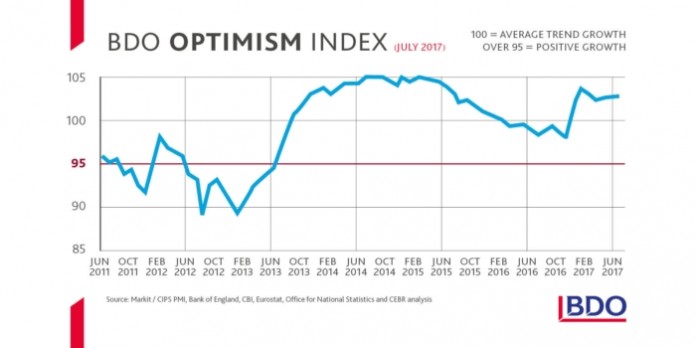UK business output is now at the point of contraction, according to the latest Business Trends Report by accountants and business advisers BDO LLP.
The new report reveals BDO’s Output Index – which indicates how businesses expect their order books to develop over the next three months – has fallen to 94.9 in June from 95.4 in May, dropping to the point of contraction, below 95.0. The latest slump leaves UK business output at a new four-year low. The growth in existing order books of UK businesses has been slowing since the end of Summer 2015 and underlines the possibility of an even weaker Q2 following subdued growth at the start of the 2017.
The poor performance of the UK services sector, which makes up the majority of the UK economy, continues to stunt economic growth. Although the manufacturing sector has shown encouraging signs of growth for the last six months, the Manufacturing Output Index dropped 0.1 points in June to 97.6. This latest result still indicates that the manufacturing sector is growing but below the long-term trend of 100. Considering that UK manufacturing contributes only 15% of the total UK GDP, this is currently well below the level of growth required to offset the services sector’s slowdown.
Despite the Output Index suggesting limited current growth, BDO’s Optimism Index – which indicates how firms expect their order books to develop in the coming six months – signals a much brighter future. The Optimism Index increased to 102.9 in June, up from 102.8 in May. The 8-point difference between the optimism and output indices is the largest ever on record. It implies that UK businesses are expecting a flurry of business activity following the political uncertainty in June, which left many businesses delaying investment plans.
Consumers will be hopeful that the anticipated increase in activity will filter through to wage growth. BDO’s Inflation Index dropped from 105.0 to 104.8 in June but inflation remains a key concern for households with consumer price inflation currently outpacing wage growth. Such inflation is eroding household budgets, which is having a negative effect on the performance of consumer-facing industries such as retail and hospitality.
Commenting on the findings, Peter Hemington, Partner, BDO LLP, said:
“Since the financial crisis, the UK’s economic recovery has been reliant on consumer spending and a growing services sector. For the past two years now we have witnessed both a decrease in the performance of the services sector, as well as a reduction in consumer spending, which has become more pronounced after the devaluation of sterling.
“To deal with the pressures of rising inflation and to accelerate economic growth, the UK’s monetary policy makers are seriously considering raising interest rates. However, given the economy’s clear weakness and the continuing uncertainty we are going to see from Brexit, to raise interest rates at the moment would be a major mistake.”






















